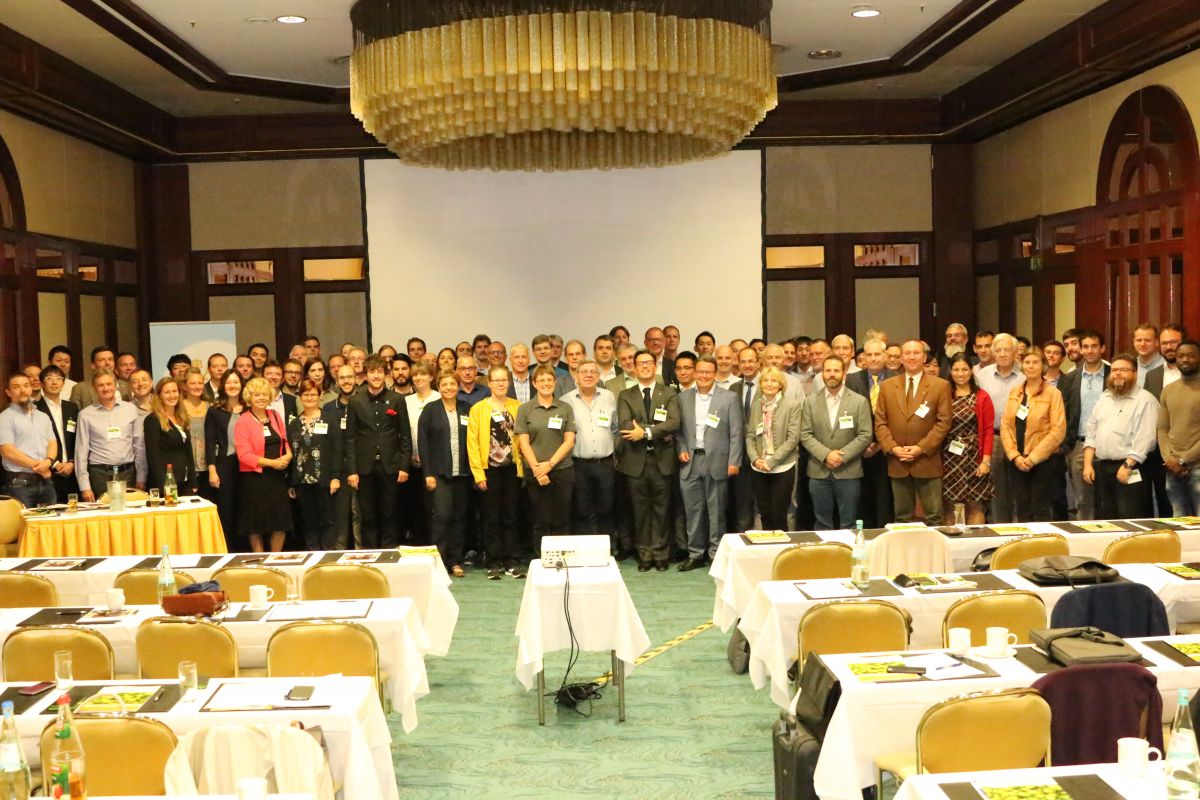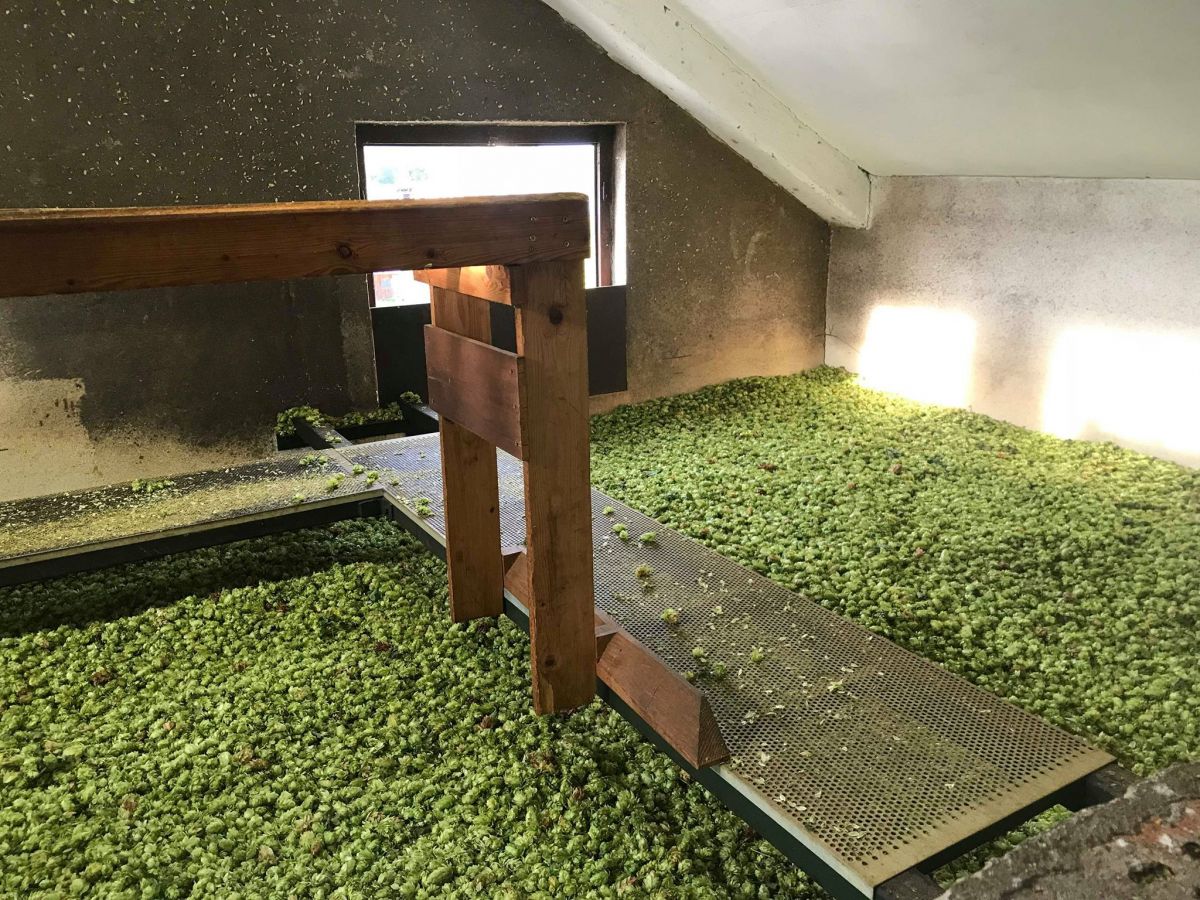I would like to thank IFST for awarding me the IFST Travel Bursary to attend the EBC Symposium “Recent Advances in Hop Science” in September 2018, which took place in Nürnberg (Nuremberg), in the south of my home  country Germany. The EBC Hop Symposium is organised by the European Brewery Convention (EBC), which also organises further symposia and congresses in the field of brewing science, provides a platform to present and discuss latest research, innovations and trends, and is well attended by brewing experts and scientists from all over the world. The symposium was particularly relevant to me because I was able to meet other researchers who work on similar projects in the field of hop flavour chemistry and I gained a lot of insight into the latest advances in analytical techniques for hop volatile analysis.
country Germany. The EBC Hop Symposium is organised by the European Brewery Convention (EBC), which also organises further symposia and congresses in the field of brewing science, provides a platform to present and discuss latest research, innovations and trends, and is well attended by brewing experts and scientists from all over the world. The symposium was particularly relevant to me because I was able to meet other researchers who work on similar projects in the field of hop flavour chemistry and I gained a lot of insight into the latest advances in analytical techniques for hop volatile analysis.
On 9 September, I arrived in Germany together with my supervisor Prof. David Cook and other colleagues from the University. The symposium was hosted in the Maritim Hotel in the heart of Nürnberg and started with a welcome party in the “Nürnberger Stuben”, which provided one of several opportunities for networking and meeting the around 100 hop experts from 20 different countries. The majority of delegates were from Germany, Belgium, Japan, and Czech Republic. On the following day, the technical programme started with the official welcoming by the EBC president Tiago Brandão and the Secretary General of the Society for Hop Research Walter König, followed by 20 oral presentations on Hop Flavour in Beer, Hop Utilization, Hops and Health, Hop Breeding and Growing, and the Analysis of Hops and of Craft Beer.
As a PhD student who is still at an early stage of research, it was a great opportunity to listen and introduce myself to all the experts that I only knew from hearsay or recent publications. I had the opportunity to share and discuss the outcomes of my first study, which focused on the sensory characterisation of hop essential oil and five of its fractions, which were sustainably obtained by sequential extraction using supercritical CO2. My PhD project is sponsored by TNS (Totally Natural Solutions Ltd, Kent, UK) and is supervised by Rebecca Ford, Associate Professor in Sensory and Consumer Science, David Cook, AB InBev Professor of Brewing Science (both at University of Nottingham), and Professor Ray Marriott, the Innovation Director at TNS.
My research study was the first systematic attempt to identify and quantify sensory attributes of hop oil in comparison to its derived fractions. This was done by using a trained sensory panel to establish a sensory attribute lexicon using a modified quantitative descriptive analysis approach. Furthermore, sensory attributes were correlated with analytical data to understand which volatiles were eliciting the sensory attributes. Correlation of sensory descriptive and gas chromatography-mass spectrometry (GC-MS) data implied that some of the fractions contain volatiles, which are not only causing pronounced aroma and flavour sensations, but are additionally potentiating taste, mouthfeel, and trigeminal-type sensations. These fractions might be involved in cross-modal interactions on a cognitive level, thereby resulting in a multi-sensory experience. It was shown that the fractionation of a hop oil, containing a complex mixture of volatiles, can deliver very distinct sensory characteristics.
Many presenters were taking current and future challenges into account, which are particularly driven by the climate change. This is also an issue that we want to tackle with my PhD project as the hop oil products (or hop oil fractions) I am using for my research are produced by a patented “green” extraction technique using organic solvents that can be used to:
- replace raw, bulky hop materials
- avoid beer losses that occur if brewing with traditional hopping techniques
- react to harvest fluctuations
The social program of the symposium included the visit of the HopfenBierGut, an interactive, modern hop and brewing museum in a 550-year-old former storehouse in Spalt, not far from Nürnberg. Before we were taken over to the museum, we could choose between visiting a traditional or a state-of-the-art hop farm. I chose the latter one and gained a good insight into the functioning of a modern hop farm and all the challenges with which small- to medium-size hop farms in Germany are confronted at the moment.
 Overall, the symposium was a very valuable experience! I believe that symposia such as the EBC Hop Symposium or the Young Scientists Symposium on Malting, Brewing and Distilling (this year hosted in Bitburg, Germany by The University of Applied Sciences Trier and the Bitburger Brewery), to which I went straight afterwards, open many doors for future careers. But these events also provide fantastic opportunities to obtain new and valuable insight for research projects from various directions since these events are likewise attended by many experts from academia and industry, including other PhD researchers. I would encourage all young scientists, whether MSc or early-stage PhD students to attend the EBC symposia and congresses, and in particular, the EBC Symposium, since it does unfortunately not take place every year!
Overall, the symposium was a very valuable experience! I believe that symposia such as the EBC Hop Symposium or the Young Scientists Symposium on Malting, Brewing and Distilling (this year hosted in Bitburg, Germany by The University of Applied Sciences Trier and the Bitburger Brewery), to which I went straight afterwards, open many doors for future careers. But these events also provide fantastic opportunities to obtain new and valuable insight for research projects from various directions since these events are likewise attended by many experts from academia and industry, including other PhD researchers. I would encourage all young scientists, whether MSc or early-stage PhD students to attend the EBC symposia and congresses, and in particular, the EBC Symposium, since it does unfortunately not take place every year!
I would like to thank IFST again for contributing to the cost of my attendance at the EBC Symposium and would recommend all IFST student members to apply for the IFST Travel Bursary and to take the opportunity to share their research at international symposia, congresses and conferences.
Christina Dietz, PhD researcher at the University of Nottingham, Sutton Bonington Campus
